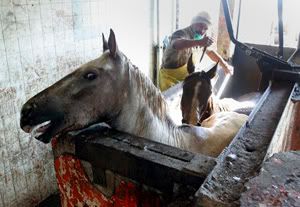The Tennessee legislature makes a good move by putting down a horse slaughter bill. Now if they would just have the guts to take on the Medical Marijuana legislation instead of delaying it by saying they would 'study' the issue.
By Laura Allen
Horse Slaughter Update April 28, 2010: Following a hearing yesterday before the full House Finance, Ways and Means, Tennessee state Rep. Frank Niceley withdrew his pro-horse slaughter bill, H.B. 1428, and it is now dead for this legislative session.
John Holland, founder and president of the Equine Welfare Alliance, and Paula Bacon, former mayor of Kaufman, Texas, site of one of the last horse slaughter plants in the U.S., testified in opposition to the bill.
Famed singer and songwriter, Willie Nelson and his daughter, Amy Nelson, and granddaughter, Raelyn Nelson, were at the hearing in opposition to this bill but did not testify before the committee.
Paula Bacon described that she was mayor of Kaufman “during part of 27 years we spent trying to deal with this horse slaughter plant.” She told the committee that a horse slaughter facility was a “burden to taxpayers…a stigma” and almost forced the city to spend “millions to upgrade ..the waste water treatment plant”.
Bacon said that building a horse slaughter facility was “very definitely not desirable economic development.” She said the facility does not create good jobs, just a handful of low paying, dangerous jobs. She described the burden on the local hospital because of the horse slaughter plant employees were often injured, even losing limbs.
She said the city derived no sales tax revenue from the horse slaughter plant. Bacon described that the $1600 in property taxes collected each year equaled about “2 weeks of a month paid in legal fees as we wrangled with this company that refused to comply with environmental laws.” She said income tax records showed in its last year of operation in the U.S., the company paid just $5 in federal income taxes on $12 million in sales and over a five year period paid only .3% of gross sales in taxes.
Bacon showed the committee 1 ½ years worth of violations of the facility’s waste water treatment permit. She noted the permit allowed the facility to release about eight times the sewage permitted other business, yet the company was still often in violation, releasing waste and blood, that overran the town’s wastewater treatment facility.
Bacon said since the closing of the horse slaughter plant by the court in 2007, the town has not needed to proceed with a $6 million+ upgrade to its waste water treatment facility.
Bacon told the committee they would be better off having lead smeltering plants or sex-related businesses in their communities than a horse slaughter plant.
John Holland told the committee “If you get nothing else out of this, you heard how horse slaughter plants closed in 2007 and it caused problems for the horses. This is not true.” He pointed out that horse slaughter remained available in Canada and Mexico and approximately the same number of horses were shipped there as had been slaughtered in the U.S.
Holland pointed out, “There are lots and lots of drugs in these horses. …Because [horsemeat] is sold to foreign countries [for human consumption, our inspectors], looked the other way.” Holland described a study led by Dr. Ann Marini that revealed bute, given to horses like aspirin, is a deadly poison, a carcinogen. Bute never breaks down and remains a danger to consumers. He described the new European Union regulations which beginning this July will require certification that slaughtered horses were drug free for 6 months and that they had never ingested certain drugs. Holland explained that by July, 2013, the EU will require that horses must be tracked from birth. “As of that point, ” said Holland, “none of [the meat] from American horses could go to the EU.” Americans don’t track horses or, for the most part, the drugs given to them. As Holland, explained, “The horses just show up at auction and no one knows [ their history].”
Holland pointed out that though slaughter rates remained the same after the U.S. plants shut down, in 2009 there was a 20% drop in horse slaughter and 125 this year so far because of slowing demand. Holland said, “This is because the EU is figuring out the danger. Europeans are figuring out horse meat is not health food as they were told and instead they are eating New Jersey race horses.” He described it as “irresponsible” for anyone to build a horse slaughter facility in the U.S. given the danger.
Holland closed his testimony by noting that the horse slaughter facility in Canada, Natural Valley, was closed last year by the government for dropping large amounts of blood in rivers with no proper disposal. He said the horse slaughter facility cost the economy of that community $42 million.
Source: Thomas Paine's Corner
More: Animal Law Coalition
Thursday, April 29, 2010
Subscribe to:
Post Comments (Atom)







No comments:
Post a Comment